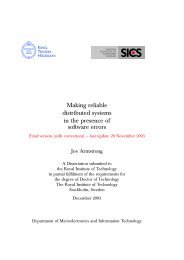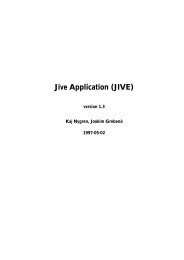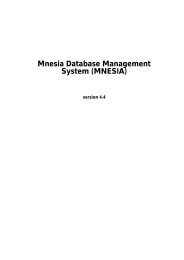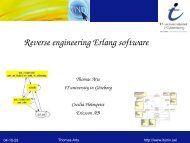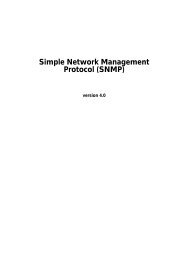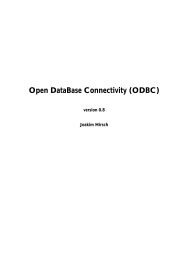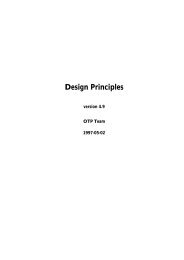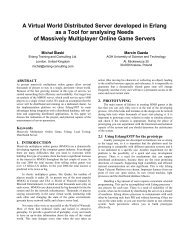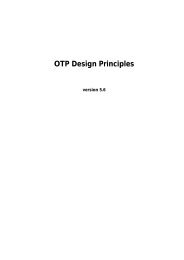Contents - Ericsson Erlang/OTP
Contents - Ericsson Erlang/OTP
Contents - Ericsson Erlang/OTP
You also want an ePaper? Increase the reach of your titles
YUMPU automatically turns print PDFs into web optimized ePapers that Google loves.
<strong>Contents</strong><br />
<strong>Erlang</strong><br />
Plan<br />
What is <strong>Erlang</strong><br />
History<br />
Essential Characteristics<br />
<strong>Erlang</strong> - Background<br />
<strong>Erlang</strong> - Properties<br />
Sequential <strong>Erlang</strong> in 5 examples<br />
Primitives for concurrency and distribution<br />
Concurrent <strong>Erlang</strong> in 3 examples<br />
Distributed <strong>Erlang</strong> in 1 example<br />
Fault tolerant <strong>Erlang</strong> in 3 examples<br />
Hot code replacement <strong>Erlang</strong> in 1 example<br />
Generic Client-Server<br />
Paramaterising the Server<br />
Comments<br />
Technique<br />
Products in <strong>Erlang</strong><br />
<strong>OTP</strong><br />
Open Source <strong>Erlang</strong><br />
Development<br />
Thoughts<br />
The Bluetail Story<br />
<strong>Contents</strong><br />
Next<br />
Previous<br />
Search<br />
Exit
Marketing<br />
Finally<br />
<strong>Contents</strong><br />
Next<br />
Previous<br />
Search<br />
Exit
<strong>Erlang</strong><br />
<strong>Contents</strong><br />
<strong>Erlang</strong> Tutorial<br />
Joe Armstrong (joe.armstrong@telia.com)<br />
Florence<br />
2 September 2001<br />
(version 1.0)<br />
Next<br />
Previous<br />
Search<br />
Exit<br />
<strong>Erlang</strong> 1
Plan<br />
• <strong>Erlang</strong>.<br />
• Plan.<br />
• What is <strong>Erlang</strong><br />
• History.<br />
• Essential Characteristics.<br />
• <strong>Erlang</strong> - Background.<br />
• <strong>Erlang</strong> - Properties.<br />
• Sequential <strong>Erlang</strong> in 5 examples.<br />
• Primitives for concurrency and distribution.<br />
• Concurrent <strong>Erlang</strong> in 3 examples.<br />
• Distributed <strong>Erlang</strong> in 1 example.<br />
• Fault tolerant <strong>Erlang</strong> in 3 examples.<br />
• Hot code replacement <strong>Erlang</strong> in 1 example.<br />
• Generic Client-Server.<br />
• Paramaterising the Server.<br />
• Comments.<br />
• Technique.<br />
<strong>Contents</strong><br />
Next<br />
Previous<br />
Search<br />
Exit<br />
Plan 2
• Products in <strong>Erlang</strong>.<br />
• <strong>OTP</strong>.<br />
• Open Source <strong>Erlang</strong>.<br />
• Development.<br />
• Thoughts.<br />
• The Bluetail Story.<br />
• Marketing.<br />
• Finally.<br />
<strong>Contents</strong><br />
Next<br />
Previous<br />
Search<br />
Exit<br />
Plan 2
What is <strong>Erlang</strong><br />
• The result of a technology transfer effort to transfer some of the best ideas in FP/Logic<br />
programming into an industrial context.<br />
• A language for programming distributed fault-tolerant soft real-time non-stop applications.<br />
• A set of well-tested libraries for programming distributed...<br />
• A set of programming patterns for programming distributed...<br />
• A set of routines for programming distributed...<br />
• An application OS for delivering distributed...<br />
• A rapid application delivery platform for programming distributed...<br />
• A functional programming language.<br />
<strong>Contents</strong><br />
Next<br />
Previous<br />
Search<br />
Exit<br />
"functional" is deliberately last in this list :-)<br />
What it is not<br />
• A research vehicle.<br />
• A language for efficient sequential computation.<br />
What is <strong>Erlang</strong> 3
History<br />
• Pre 1986 - Programming experiments - how to program a telephone exchange.<br />
• 1986 - <strong>Erlang</strong> emerges as dialect of Prolog. Implementation is a Prolog interpretor - 1<br />
developer (Joe).<br />
• 1989 - 3 developers (Mike, Robert, Joe), 10 Users. Own abstract machine (JAM)<br />
• 1993 - <strong>Erlang</strong> systems founded (25 people).<br />
• 1996 - <strong>OTP</strong> formed. AXD301 development starts.<br />
• 1998 - <strong>Erlang</strong> banned within <strong>Ericsson</strong> for new products.<br />
• 1998 - Open source <strong>Erlang</strong>.<br />
• 1998 - <strong>Erlang</strong> "fathers" quit <strong>Ericsson</strong>. Starts Bluetail.<br />
• 2000 - Blutail sold to Alteon Web systems.<br />
• 2000 - Alteon web systems sold to Nortel Networks<br />
• 2001 - Nortel produces SSL accelerator (best in test),<br />
http://www.networkcomputing.com/1212/1212f46.html + ISD platform.<br />
• 2001 - <strong>Erlang</strong> (Alteon) group is "down-sized".<br />
<strong>Contents</strong><br />
Next<br />
Previous<br />
Search<br />
Exit<br />
History 4
Essential Characteristics<br />
These are essential:<br />
• Change code in a running system.<br />
• Dynamic sizes of all objects.<br />
• Fast context switching/message passing.<br />
• Low memory overhead per process/task.<br />
• Thousands of processes.<br />
• No memory leaks/fragmentation.<br />
• No "global" errors. Stop errors propagating.<br />
• Methods to be able to recover from SW and HW errors.<br />
• Simple language, easy to learn.<br />
• Predictable performance.<br />
• Easy to port/implement.<br />
Non essential<br />
• Static type system.<br />
• "Pure".<br />
• Lazy.<br />
<strong>Contents</strong><br />
Next<br />
Previous<br />
Search<br />
Exit<br />
Essential Characteristics 5
<strong>Erlang</strong> - Background<br />
Background:<br />
• Computer Science Lab founded 1983.<br />
• Experiments with:Ada, C, concurrent Euclid, Eri-Pascal, CLU, ML, CML, LPL, PFL, Hope,<br />
Prolog, OPS5, with real telecom hardware .<br />
• Solve "essential characteristics".<br />
• Use standard OS.<br />
• Use standard processors.<br />
• Distributed system.<br />
• High level language.<br />
<strong>Contents</strong><br />
Next<br />
Previous<br />
Search<br />
Exit<br />
<strong>Erlang</strong> - Background 6
<strong>Erlang</strong> - Properties<br />
• Functional/single assignment.<br />
• Light weight processes.<br />
• Asynchronous message passing (send and pray).<br />
• OS independent.<br />
• Special error handling primitives.<br />
• Lists, tuples, binaries.<br />
• Dynamic typing (an optional soft typing system is being developed).<br />
• Real-time GC.<br />
<strong>Contents</strong><br />
Next<br />
Previous<br />
Search<br />
Exit<br />
<strong>Erlang</strong> - Properties 7
Sequential <strong>Erlang</strong> in 5 examples<br />
1 - Factorial<br />
-module(math).<br />
-export([fac/1]).<br />
fac(N) when N > 0 -> N * fac(N-1);<br />
fac(0) -> 1.<br />
> math:fac(25).<br />
15511210043330985984000000<br />
<strong>Contents</strong><br />
Next<br />
Previous<br />
Search<br />
Exit<br />
2 - Binary Trees<br />
lookup(Key, {Key, Val, _, _}) -><br />
{ok, Val};<br />
lookup(Key,{Key1,Val,S,B}) when Key < Key1 -><br />
lookup(Key, S);<br />
lookup(Key, {Key1,Val,S,B}) -><br />
lookup(Key, B);<br />
lookup(Key, nil) -><br />
not_found.<br />
3 - Append<br />
Sequential <strong>Erlang</strong> in 5 examples 8
4 - Sort<br />
append([H|T], L) -> [H|append(T, L)];<br />
append([], L) -> L.<br />
sort([Pivot|T]) -><br />
sort([X||X Adder = fun(N) -> fun(X) -> X + N end end.<br />
#Fun<br />
> G = Adder(10).<br />
#Fun<br />
> G(5).<br />
15<br />
Sequential <strong>Erlang</strong> in 5 examples 8
Primitives for concurrency and distribution<br />
<strong>Contents</strong><br />
spawn<br />
Pid = spawn(fun() -> loop(0) end).<br />
Next<br />
Previous<br />
send and receive<br />
Pid ! Message,<br />
.....<br />
Search<br />
Exit<br />
receive<br />
Message1 -><br />
Actions1;<br />
Message2 -><br />
Actions2;<br />
...<br />
after Time -><br />
TimeOutActions<br />
end<br />
Distribution<br />
Primitives for concurrency and distribution 9
...<br />
Pid = spawn(Fun@Node)<br />
...<br />
alive(Node)<br />
...<br />
not_alive(Node)<br />
<strong>Contents</strong><br />
Next<br />
Previous<br />
Search<br />
Exit<br />
Primitives for concurrency and distribution 9
Concurrent <strong>Erlang</strong> in 3 examples<br />
1 - "area" server<br />
-module(math).<br />
-export([fac/1]).<br />
start() -><br />
spawn(fun() -> loop(0) end).<br />
loop(Tot) -><br />
receive<br />
{Pid, {square, X}} -><br />
Pid ! X*X,<br />
loop(Tot + X*X);<br />
{Pid, {rectangle,[X,Y]}} -><br />
Pid ! X*Y,<br />
loop(Tot + X*Y);<br />
{Pid, areas} -><br />
Pid ! Tot,<br />
loop(Tot)<br />
end.<br />
<strong>Contents</strong><br />
Next<br />
Previous<br />
Search<br />
Exit<br />
2 - Area client<br />
Concurrent <strong>Erlang</strong> in 3 examples 10
Pid ! {self(), {square, 10}},<br />
receive<br />
Area -><br />
...<br />
end<br />
3 - Global Server<br />
...<br />
Pid = spawn(Fun),<br />
register(bank, Pid),<br />
...<br />
bank ! ...<br />
<strong>Contents</strong><br />
Next<br />
Previous<br />
Search<br />
Exit<br />
Concurrent <strong>Erlang</strong> in 3 examples 10
Distributed <strong>Erlang</strong> in 1 example<br />
...<br />
Pid = spawn(Fun@Node)<br />
...<br />
alive(Node)<br />
...<br />
not_alive(Node)<br />
<strong>Contents</strong><br />
Next<br />
Previous<br />
Search<br />
Exit<br />
Distributed <strong>Erlang</strong> in 1 example 11
Fault tolerant <strong>Erlang</strong> in 3 examples<br />
1 - catch<br />
> X = 1/0.<br />
** exited: {badarith, divide_by_zero} **<br />
> X = (catch 1/0).<br />
{’EXIT’,{badarith, divide_by_zero}}<br />
> b().<br />
X = {’EXIT’,{badarith, divide_by_zero}}<br />
<strong>Contents</strong><br />
Next<br />
Previous<br />
Search<br />
Exit<br />
2 - Catch and throw<br />
case catch f(X) -><br />
{exception1, Why} -><br />
Actions;<br />
NormalReturn -><br />
Actions;<br />
end,<br />
f(X) -><br />
...<br />
Normal_return_value;<br />
f(X) -><br />
...<br />
throw({exception1, ...}).<br />
Fault tolerant <strong>Erlang</strong> in 3 examples 12
3 - Links and trapping exits<br />
process_flag(trap_exits, true),<br />
P = spawn_link(Node, Mod, Func, Args),<br />
receive<br />
{’EXIT’, P, Why} -><br />
Actions;<br />
...<br />
end<br />
<strong>Contents</strong><br />
Next<br />
Previous<br />
Search<br />
Exit<br />
Fault tolerant <strong>Erlang</strong> in 3 examples 12
Hot code replacement <strong>Erlang</strong> in 1 example<br />
Here’s the server:<br />
loop(Data, F) -><br />
receive<br />
{request, Pid, Q} -><br />
{Reply, Data1} = F(Q, Data),<br />
Pid ! Reply,<br />
loop(Data1, F);<br />
{change_code, F1} -><br />
loop(Data, F1)<br />
end<br />
<strong>Contents</strong><br />
Next<br />
Previous<br />
Search<br />
Exit<br />
To do a code replacement operation do something like:<br />
Server ! {change_code, fun(I, J) -><br />
do_something(...)<br />
end}<br />
The (real-time) garbage collector removes F!<br />
Hot code replacement <strong>Erlang</strong> in 1 example 13
Generic Client-Server<br />
start(Name, Data, Fun) -><br />
register(Name,<br />
spawn(fun() -><br />
loop(Data, Fun)<br />
end)).<br />
rpc(Name, Q) -><br />
Tag = ref(),<br />
Name ! {query, self(), Tag, Q},<br />
receive<br />
{Tag, Reply} -> Reply<br />
end.<br />
<strong>Contents</strong><br />
Next<br />
Previous<br />
Search<br />
Exit<br />
loop(Data, F) -><br />
receive<br />
{query, Pid, Tag, Q} -><br />
{Reply, Data1} = F(Q, Data),<br />
Pid ! {Tag, Reply},<br />
loop(Data1, F)<br />
end.<br />
Generic Client-Server 14
Paramaterising the Server<br />
start() -> cs:start(keydb, [], fun handler/2).<br />
add(Key, Val) -> cs:rpc(keydb, {add, Key, Val}).<br />
lookup(Key) -> cs:rpc(keydb, {lookup, Key}).<br />
handler({add, Key, Val}, Data) -><br />
{ok, add(Key,Data)}.<br />
handler({lookup, Key}, Data) -><br />
{find(Key, Data), Data}.<br />
<strong>Contents</strong><br />
Next<br />
Previous<br />
Search<br />
Exit<br />
add(Key,Val,[{Key, _}|T]) -> [{Key,Val}|T];<br />
add(Key,Val,[_|T]) -> [H|add(Key,Val,T)];<br />
add(Key,Val,[])<br />
-> [{Key,Val}].<br />
find(Key,[{Key,Val}|_]) -> {found, Val};<br />
find(Key,[H|T])<br />
-> find(Key, T);<br />
find(Key,[])<br />
-> error.<br />
• Sequential.<br />
• Can be typed.<br />
• Isolates (concurrent + error handling + ...) code from sequential code.<br />
Paramaterising the Server 15
Comments<br />
Why is this nice<br />
• We can structure the system so that 95% of the code is written as client code and 5% as<br />
“concurrency patterns”.<br />
• We could type check the client code.<br />
• We cannot type check the generic code.<br />
• The generic code is written and tested by “experts”.<br />
• Client code written by applications programmers.<br />
• 10 patterns suffice for almost all know patterns of concurrency. Client-server, Workersupervisor,<br />
event-handler, upgrade-handler, keep-me-alive, hot-standby.<br />
<strong>Contents</strong><br />
Next<br />
Previous<br />
Search<br />
Exit<br />
Comments 16
Technique<br />
• 1986 - 1989 Prolog interpretor.<br />
• 1988 - JAM.<br />
• 1989 - Vee.<br />
• 1992 - Beam.<br />
• 1995 - Types.<br />
• 1996 - Hype.<br />
• 1997 - <strong>Erlang</strong>97, Standard.<br />
• 1998 - FPGA.<br />
<strong>Contents</strong><br />
Next<br />
Previous<br />
Search<br />
Exit<br />
Technique 17
Products in <strong>Erlang</strong><br />
• 1986 - 1988 ACS/Dunder (<strong>Ericsson</strong>).<br />
• 1988 - 1993 Many small projects.<br />
• 1992 - 1995 MOB (<strong>Ericsson</strong>).<br />
• 1992 - 1994 A few medium projects (NetSim, Teletrain, ..) (<strong>Ericsson</strong>).<br />
• 1996 - ATM, Elvira (MOB2)(<strong>Ericsson</strong>).<br />
• 1998 - AXD301 (<strong>Ericsson</strong>).<br />
• 1999 - GPRS (<strong>Ericsson</strong>).<br />
• 2000 - Mail robustifier (Bluetail).<br />
• 2001 - ISD platform, SSL accelerator (Nortel/Alteon).<br />
<strong>Contents</strong><br />
Next<br />
Previous<br />
Search<br />
Exit<br />
Products in <strong>Erlang</strong> 18
<strong>OTP</strong><br />
What is <strong>OTP</strong><br />
<strong>OTP</strong> stands for Open Telecom Platform . <strong>OTP</strong> is a "middleware platform for building highavailability,<br />
fault-tolerant, distributed, soft real-time, applications.<br />
• A large number of libraries.<br />
• A collection of behaviors (programming patterns) which encapsulate common behavorial<br />
patterns. For example, client-server, supervision-tree, ...<br />
• A set of applications - completed software components that can be plugged together to perform<br />
complex tasks. For example, eva - a distributed event and history logging infrastructure,<br />
Corba, ...<br />
• Similar in scope to .NET - but limited to one language (<strong>Erlang</strong>).<br />
• Available from http://www.erlang.org/.<br />
• "Open source" license (do what you want).<br />
<strong>Contents</strong><br />
Next<br />
Previous<br />
Search<br />
Exit<br />
<strong>OTP</strong> 19
Open Source <strong>Erlang</strong><br />
• OSE - is the same <strong>Erlang</strong> release that <strong>Ericsson</strong> uses in its products. For example, AXD301<br />
GRPS etc.<br />
• Produced by <strong>Ericsson</strong> <strong>OTP</strong> group - with external inputs :-).<br />
• Used in several <strong>Ericsson</strong> products (AXD301, GRPS etc.) - and in a number of new Nortel<br />
products (SSL accelerator, ISD platform etc.).<br />
• Highly mature implementation - i.e. the first public <strong>Erlang</strong> release (1998) had already been<br />
proved in several commercial products (Mobility server etc.) - The ERTS (<strong>Erlang</strong> Run<br />
Time System) might inspire anyone interested in implementation issues for systems offering<br />
concurrency together with garbage collected languages (for example Java or CIL compiled<br />
languages in .NET ).<br />
• Has demonstrated long term performance reliability. Possibly years of non-stop operation<br />
(nobody really knows :-).<br />
<strong>Contents</strong><br />
Next<br />
Previous<br />
Search<br />
Exit<br />
Open Source <strong>Erlang</strong> 20
Development<br />
• 1986 – 1 developer, 0 users, 0 support.<br />
• 1989 – 3 developers, 10 users, 0.5 support.<br />
• 1991 – 4 developers, 40 users, 1.0 support.<br />
• 1993 – <strong>Erlang</strong> systems founded. ES grows from 3 - 25 people in 3 years.<br />
• 1996 – <strong>OTP</strong> founded. Grows to 30 in 2 years.<br />
• 1997 – 10 developers. 300 <strong>Erlang</strong> programmers (1000 total project employed). 5 big (100+)<br />
projects. Many small (< 20) projects.<br />
Needed <strong>Erlang</strong> Systems to expand. Courses/consulting vital for first phase of expansion.<br />
Needed <strong>OTP</strong> to get into <strong>Ericsson</strong> mainstream. Needed good documentation, professional project<br />
management and revision control.<br />
If it hasn’t got a part number it doesn’t exist.<br />
We still did everything ourselves but we got more help.<br />
<strong>Contents</strong><br />
Next<br />
Previous<br />
Search<br />
Exit<br />
Development 21
Thoughts<br />
• The “gap” – the best that research has to offer and the minimum acceptable by industry is<br />
too large.<br />
• You need good support. e-mail, telephone, consulting (days - years).<br />
• Good documentation costs money.<br />
• To displace an existing technology you have to wait for something to fail .<br />
• Step into the vacuum after a crisis has occurred – look for the gaps.<br />
• Use “satisfied users” to sell to new users (credibility).<br />
• Don’t fight, you never win, you only loose.<br />
• Ditch committees, pre-studies, reports – find the hero programmer.<br />
• Talk, talk, talk, talk to the hero programmer (not telephone, e-mail etc.<br />
• Put all development on one site (corridor).<br />
<strong>Contents</strong><br />
Next<br />
Previous<br />
Search<br />
Exit<br />
Thoughts 22
The Bluetail Story<br />
• 1998 - Bluetail was formed by the <strong>Erlang</strong> "fathers" (except Mike Williams, who stayed on in<br />
<strong>Ericsson</strong> and in now a "big boss") + Jane Walerud.<br />
• Business idea - Bringing reliability to the Internet .<br />
• 1999 - First product (BMR = Bluetail Mail Robustifier) - programmed in <strong>Erlang</strong> in three<br />
months from scratch.<br />
• BMR programmed using a generic "reliable, high-availability" behavior - a behavior that can<br />
be paramaterised with 17 different funs.<br />
• 1999 - BMR sold to Telnordia (Swedens 3’rd biggest ISP) handles all Telnordia e-mail.<br />
• 2000 - Bluetail sold to Alteon web systems for 1.4B SEK. They were after the technology<br />
(<strong>Erlang</strong>).<br />
• 2000 - Alteon sold to Nortel networks for 7.8B USD.<br />
• 2000 - Jane Walerud - Swedish "IT person of the year".<br />
• 2001 - The death the the dotcoms - downsized. Nortel writes off 8B USD for the Alteon<br />
purchase.<br />
<strong>Contents</strong><br />
Next<br />
Previous<br />
Search<br />
Exit<br />
The Bluetail Story 23
Marketing<br />
Don’t<br />
• tell them its a PL.<br />
• use the word declarative (they might ask you what it means!).<br />
• use the word functional.<br />
• confuse them with measurements and facts.<br />
• claim you can do everything (you can’t).<br />
Emphase<br />
• time to market (it’s shorter).<br />
• total life cycle costs (reduced).<br />
• total cost of ownership (reduced).<br />
• the IPSE, or IDE (don’t use the word “emacs”).<br />
• the re-usable components, or API’s (don’t call them libraries).<br />
<strong>Contents</strong><br />
Next<br />
Previous<br />
Search<br />
Exit<br />
Use latest buzzwords<br />
There is a “performance gap” – but we try to run on the fastest available processors, then the gap is less of a problem. We are “sufficiently fast”<br />
Marketing 24
Finally<br />
• Concentrate on essential features .<br />
• You will never displace an existing technology if it works – Wait for the failures .<br />
• Move quickly into the vacuum after a failure.<br />
• Develop new unchallenged application areas.<br />
• 5% of all real system software sucks – don’t worry. Ship it and improve it later.<br />
• FP is a here and now technology – companies using FP will demonstrate real commercial<br />
advantage over those using conventional technology<br />
• You need a business infrastructure (People expert in Business development, Marketing, Sales,<br />
Lawyers, ...) to succeed.<br />
• Writing a business plan is just like writing a research proposal.<br />
• Writing a patent plan is just like writing a conference paper.<br />
• Move towards the mainstream.<br />
• Don’t be shy asking for money - remember it is the programmers who are the heros - we<br />
invented the Internet.<br />
• Nurture your VCs, lawyers, business people. Explain to them how it works, in terms that<br />
they can understand. Be very patient.<br />
• Do fun stuff.<br />
• Have fun.<br />
<strong>Contents</strong><br />
Next<br />
Previous<br />
Search<br />
Exit<br />
Finally 25



